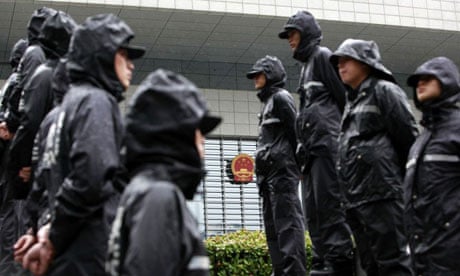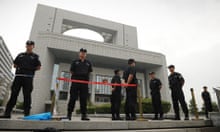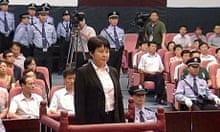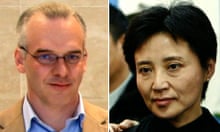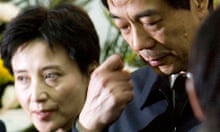China's highest profile trial for three decades has ended after one day, as ousted politician Bo Xilai's wife Gu Kailai stood trial for the murder of British businessman Neil Heywood under intense security.
There has been no word on when a verdict will be delivered.
As the hearing began, police dragged away two singing protestors who appeared outside the Hefei intermediate people's court in Anhui. "I don't believe it. This case was decided well in advance," Hu Jiye, a middle-aged man wearing a T-shirt and baseball cap, told reporters at the rear of the courthouse.
His friend shouted "Why are you taking me?" and struggled as some of
the dozens of plain clothed officers surrounding the building shoved
the two men into a car.
Scores of regular police had also guarded the taped-off granite and glass building. Roads around it were blocked to traffic, with dozens of police cars and vans parked nearby.
Shortly before the start, a convoy of black cars drove in a side entrance into an underground parking lot and two British diplomats entered the court. It is thought that Gu and her co-defendant, family employee Zhang Xiaojun, arrived earlier from the Hefei detention centre, on the eastern side of the city.
The trial is expected to lead to swift convictions for Gu, 53, and Zhang, 33. They are likely to be sentenced shortly afterwards with potential penalties ranging from 10 years in jail to the death penalty.
Hefei, the capital of Anhui province, is known as the home of Lord Bao, an eleventh century official still seen as an icon of justice and righteous officials in China.
"Today you should go to the Lord Bao temple, steal his statue and put it in front of the court," wrote one user on Sina's Weibo microblog. Lawyer Li Fangping wrote: "The security of the Hefei intermediate court is definitely number one in the world but whether it can ensure just proceedings is another question."
Responding to another user's post, the artist and activist Ai Weiwei wrote on Twitter: "The 'justice' of no justice, no fairness, and no openness to the public. It is sad."
Relatives of Gu and Zhang hired lawyers to represent them, but were then told that the defendants had accepted state-appointed lawyers.
Reuters said Jiang Min, Gu's main lawyer, has previously described himself as "an expert in financial law, who rarely conducts criminal defences", although he has represented some officials accused of corruption. Little is known of her other lawyer.
Most Chinese media restricted themselves to running the official announcement of the indictment. But one bold newspaper, the Shenzhen Evening News, ran front page pictures of Gu and Heywood.
"Some people said a big murder case had started. I half-believed, half-suspected. I checked Xinhua [the official news agency], I checked People's Daily and I checked several major Chinese websites and didn't find the report," wrote another lawyer, Liu Xiaoyuan, on the Sina Weibo microblog, adding that he had found the news on overseas websites instead.
Heywood died in Chongqing, the south-western municipality where Bo was party secretary, in November last year. Although he was only 41, and a light drinker, his family accepted the explanation of local officials that he died of excessive alcohol consumption.
It was only in February, after the city's former police chief fled to an American consulate following a row with Bo, that doubts about his death led the UK to request a re-investigation. China announced two months later that Gu and Zhang had been detained and were "highly suspected" of his murder.
Though many in China suspect Gu is guilty, Bo's sympathisers nonetheless see her case as part of a push by his enemies to topple the popular but polarising politician. Some had believed he could climb to the top political body in the once-a-decade leadership transition this year.
Bo is still under internal party investigation on suspicion of disciplinary violations. He has not been seen since he was toppled as party secretary of Chongqing in March.
Early leaks claimed that Gu had poisoned Heywood over an unspecified economic dispute. But the announcement of the indictment suggested she had been concerned for the safety of her son Bo Guagua following such a dispute - suggesting her maternal fears might be used as a mitigating factor in her case, perhaps to justify a suspended death sentence.
